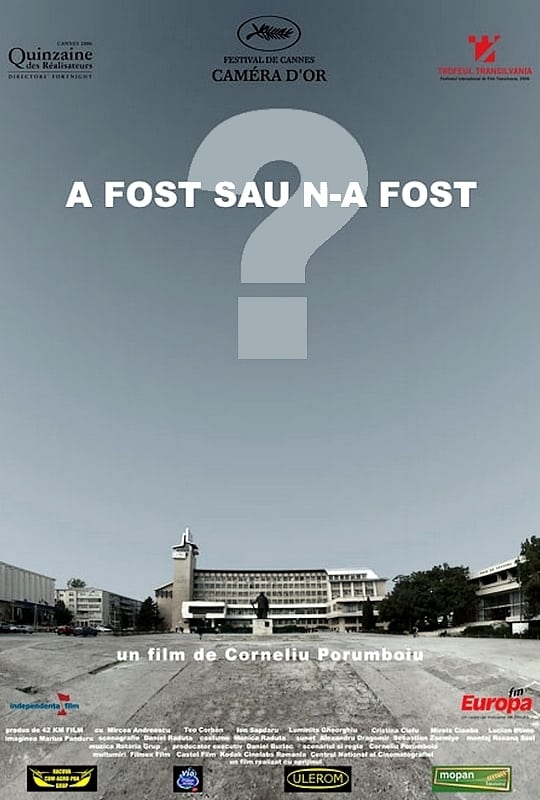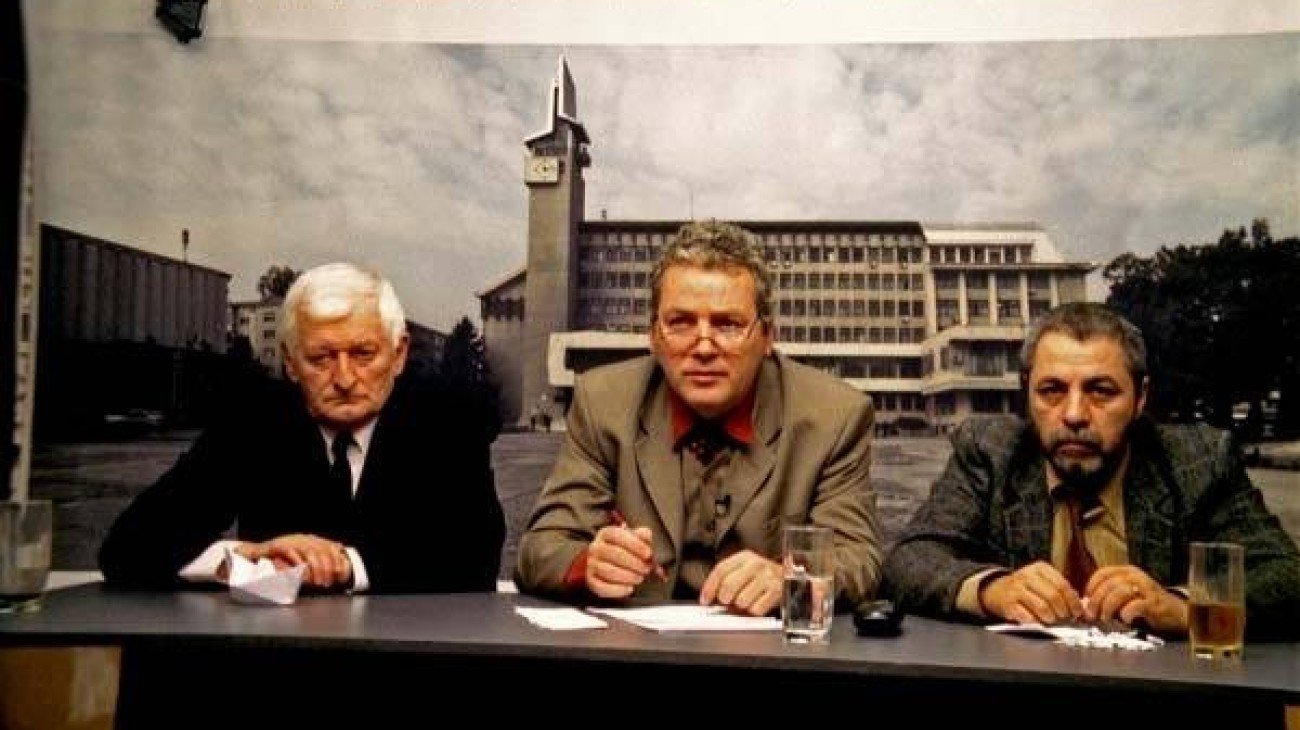
The 42nd Chicago International Film Festival
The funniest movie I've seen all year is a satire on the state of public discourse in Romania.
No wait, come back! Please?
A fost sau n-a fost?, or 12:08 East of Bucharest to us Yanks (the original title translates, I believe, as Was It or Wasn't It?, making this one of the exceedingly rare films whose English language title is an improvement), takes place in a middle-sized Romanian town on December 22, 2005, the 16th anniversary of that country's expulsion of Communist rule. Mr. Jderescu (Teodor Corban) is a local talk-show host and station owner who wants to commemorate the event on his program, hosting a panel to discuss the question, "was there or wasn't there a revolution in this town?" The guests he manages to harangue into appearing are Mr. Piscoci (Mircea Andreescu) and Mr. Manescu (Ion Sapdaru), two men who both claim to have been present in the town square to protest the Communist government on the day it fell.
The question on nobody's mind beside Jderescu's: did the protest occur before or after 12:08 PM, when Ceausescu stepped down, and therefore did a revolution occur in the town? And the more significant question that first-time writer/director Corneliu Porumboiu seems to ask: was there a Romanian revolution at all, or did Ceausescu just see what direction the winds were blowing?
Before we get to that point, the film indulges in a lengthy, magnificent introduction to our three leads. Piscosi is a cranky retiree who agrees to act as Santa Claus after a local mother appeals to his vanity. Manescu is a drunk history teacher with debts enough to swallow his entire paycheck. Jderescu is a pretentious workaholic ass. All three of them are sick and tired of the local kids setting of firecrackers inside apartment buildings.
For some 40 minutes, the film languidly follows them around, nothing happens, and it's wonderful. There's not much to it besides a typical slice-of-life anti-narrative, but like all styles that can be done well or poorly, and it this is done quite well, both because of the sharp writing with which Porumboiu sketches his characters, and because of the flawless performances. It's a film of simple goals and simple technique, but it is simplicity done to perfection. Jderescu, Piscosi and Manescu are three of the finest characters I have seen in a film this year.
Then the second half kicks in and the film goes from pleasant to laugh-out-loud hysterical. It's Jderescu's talk show, and it is the most inept thing you have ever seen. Having apparently hired high-schoolers to film the thing, Jderescu has to direct in addition to host (the film is from the videocameras' perspectives throughout this sequence, leading to several amazing gags such as the camera drooping forward to the ground, a zoom that leaves Piscosi just a disembodied nose, and other reminders of film school). Manescu, who claims to have stood in the square all morning protesting is quickly revealed as a liar, but refuses to give up his story. Piscosi, being asked no questions for about 15 minutes, entertains himself by making paper hats. And meanwhile, Porumboiu is asking serious questions: how reliable is memory? How does history happen? What does "revolution" mean, anyway? They're the sort of questions that matter more for the asking than the answering, thankfully.
What is it about East Europeans, that even their stoopid comedies are depressing and thoughtful, and ask questions about the nature of mind and perception? Meanwhile, we're left with things like Employee of the Month, whose only memory-related issue is how much must one drink in order to forget having seen it.
The film changes again in the last 10 minutes, and it is a very special thing that I will not spoil, because against all rationality I want to believe that this film might ever be distributed in America. Suffice it to say that the ultimate theme of A fost sau n-a fost? could probably be summed up as, "who cares? Ceausescu's gone." Ah, lovely Romanian pragmatism! And yet still so much fun!
No wait, come back! Please?
A fost sau n-a fost?, or 12:08 East of Bucharest to us Yanks (the original title translates, I believe, as Was It or Wasn't It?, making this one of the exceedingly rare films whose English language title is an improvement), takes place in a middle-sized Romanian town on December 22, 2005, the 16th anniversary of that country's expulsion of Communist rule. Mr. Jderescu (Teodor Corban) is a local talk-show host and station owner who wants to commemorate the event on his program, hosting a panel to discuss the question, "was there or wasn't there a revolution in this town?" The guests he manages to harangue into appearing are Mr. Piscoci (Mircea Andreescu) and Mr. Manescu (Ion Sapdaru), two men who both claim to have been present in the town square to protest the Communist government on the day it fell.
The question on nobody's mind beside Jderescu's: did the protest occur before or after 12:08 PM, when Ceausescu stepped down, and therefore did a revolution occur in the town? And the more significant question that first-time writer/director Corneliu Porumboiu seems to ask: was there a Romanian revolution at all, or did Ceausescu just see what direction the winds were blowing?
Before we get to that point, the film indulges in a lengthy, magnificent introduction to our three leads. Piscosi is a cranky retiree who agrees to act as Santa Claus after a local mother appeals to his vanity. Manescu is a drunk history teacher with debts enough to swallow his entire paycheck. Jderescu is a pretentious workaholic ass. All three of them are sick and tired of the local kids setting of firecrackers inside apartment buildings.
For some 40 minutes, the film languidly follows them around, nothing happens, and it's wonderful. There's not much to it besides a typical slice-of-life anti-narrative, but like all styles that can be done well or poorly, and it this is done quite well, both because of the sharp writing with which Porumboiu sketches his characters, and because of the flawless performances. It's a film of simple goals and simple technique, but it is simplicity done to perfection. Jderescu, Piscosi and Manescu are three of the finest characters I have seen in a film this year.
Then the second half kicks in and the film goes from pleasant to laugh-out-loud hysterical. It's Jderescu's talk show, and it is the most inept thing you have ever seen. Having apparently hired high-schoolers to film the thing, Jderescu has to direct in addition to host (the film is from the videocameras' perspectives throughout this sequence, leading to several amazing gags such as the camera drooping forward to the ground, a zoom that leaves Piscosi just a disembodied nose, and other reminders of film school). Manescu, who claims to have stood in the square all morning protesting is quickly revealed as a liar, but refuses to give up his story. Piscosi, being asked no questions for about 15 minutes, entertains himself by making paper hats. And meanwhile, Porumboiu is asking serious questions: how reliable is memory? How does history happen? What does "revolution" mean, anyway? They're the sort of questions that matter more for the asking than the answering, thankfully.
What is it about East Europeans, that even their stoopid comedies are depressing and thoughtful, and ask questions about the nature of mind and perception? Meanwhile, we're left with things like Employee of the Month, whose only memory-related issue is how much must one drink in order to forget having seen it.
The film changes again in the last 10 minutes, and it is a very special thing that I will not spoil, because against all rationality I want to believe that this film might ever be distributed in America. Suffice it to say that the ultimate theme of A fost sau n-a fost? could probably be summed up as, "who cares? Ceausescu's gone." Ah, lovely Romanian pragmatism! And yet still so much fun!
Categories: balkan cinema, best of the 00s, ciff, comedies, romanian cinema, satire, tis the season, top 10






